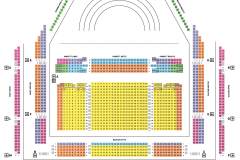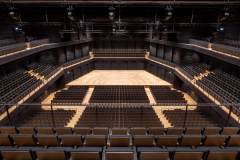Carmina Burana and Boléro
Mo | Tu | We | Th | Fr | Sa | Su |
A concert featuring undisputed classics: The program includes Ravel's electrifying "Boléro," Borodin's exhilarating "Polovtsian Dances," and Orff's magnificent "Carmina Burana." Although "Boléro" and "Carmina Burana" were composed only seven years apart, they are equally contrasting and similar. Ravel's one-movement dance is based on two musical ideas that are repeated over and over again. In a crescendo that spans the entire piece, it begins mystically-meditative and ends in a powerful ecstasy.
Meditation and ecstasy also characterize Carl Orff's global success: alongside striking rhythms, it is the melodic and harmonic richness that creates the unique charm of this collection. The musical journey through Spain and medieval Benediktbeuern ultimately leads to Borodin's "Polovtsian Dances" from "Prince Igor."
Program and cast
Sunday, November 24, 2024
Prague Royal Philharmonic
Munich Motet Choir
Tölz Boys' Choir
Bryndís Guðjónsdóttir, Soprano
Daniel Matousek, Tenor
Paul Gukhoe Song, Baritone
Heiko Mathias Förster, Conductor
Program
Ravel: Boléro
Borodin: Polovtsian Dances
Orff: Carmina Burana
Tuesday, March 25, 2025
Munich Symphony Orchestra
Munich Bach Choir
Munich Boys' Choir
Jasmin Delfs, Soprano
Tobias Hunger, Tenor
Daniel Ochoa, Baritone
Johanna Soller, Conductor
Program
Borodin: Polovtsian Dances
Ravel: Boléro
Orff: Carmina Burana
Isar Philharmonic
Isarphilharmonie
Munich’s most modern concert hall
Since the Isarphilharmonie opened in October 2021, it has quickly gained a reputation for its special atmosphere and excellent sound. The list of orchestras performing here reads like a veritable Who’s Who, headed by the Munich Philharmonic, the Bavarian Radio Symphony Orchestra and the Munich Chamber Orchestra. High profile concert agencies see the auditorium as the perfect place for guest appearances by national and international orchestras and it also hosts jazz productions and large-scale popular music concerts of all genres.
But the Isarphilharmonie also has another string to its bow: it can be blacked out, making it the ideal venue for film screenings – with or without orchestral accompaniment. The auditorium is equipped with a large screen and top-class cinematic sound systems.
Architecture & acoustics
The building that houses the Isarphilharmonie is a steel structure with an internal volume of nearly 60,000 cubic metres. The concert hall itself can accommodate almost 2000 guests and is made from prefabricated solid wood elements. The walls are clad with black-stained softwood panels, while the stage and floors are made from light cedar wood for a striking contrast. The Isarphilharmonie at Gasteig HP8 was built by the general contractor NÜSSLI to the plans of architects gmp – Gerkan, Marg und Partner.
The Isarphilharmonie acoustics were created by Nagata Acoustics International – the team led by star acoustician Yasuhisa Toyota – who were also involved with the construction of the Elbphilharmonie Hamburg and the Philharmonie de Paris.

 EN
EN DE
DE IT
IT FR
FR ES
ES RU
RU JP
JP RO
RO
 Seating plan
Seating plan 